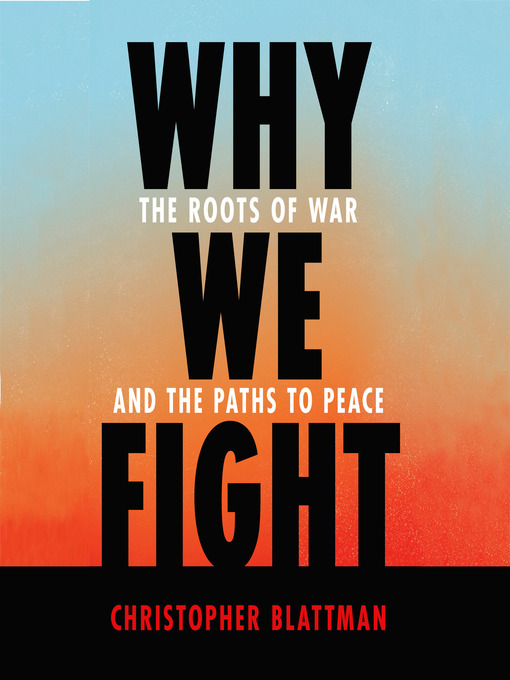- All Fiction
- Military Fiction
- Historical Fiction
- Mystery & Thriller
- Romance
- See all fiction collections
Why We Fight
The Roots of War and the Paths to Peace
It’s easy to overlook the underlying strategic forces of war, to see it solely as a series of errors, accidents, and emotions gone awry. It’s also easy to forget that war shouldn’t happen—and most of the time it doesn’t. Around the world, there are millions of hostile rivalries, yet only a fraction erupt into violence, a fact too many accounts overlook.
With a counterintuitive approach, Christopher Blattman reminds us that most rivals loathe one another in peace. War is too costly to fight, so enemies almost always find it better to split the pie than spoil it for everyone or struggle over thin slices. In those rare instances when fighting ensues, we should ask: What kept rivals from compromise?
Why We Fight draws on decades of economics, political science, psychology, and real-world interventions to lay out the root causes and remedies for war, showing that violence is not the norm; that there are only five reasons why conflict wins over compromise; and how peacemakers turn the tides through tinkering, not transformation.
From warring states to street gangs, ethnic groups and religious sects to political factions, there are common dynamics to heed and lessons to learn. Along the way, through Blattman’s time studying Medellín, Chicago, Sudan, England, and more, we learn from vainglorious monarchs, dictators, mobs, pilots, football hooligans, ancient peoples, and fanatics.
What of remedies that shift incentives away from violence and get parties back to dealmaking? Societies are surprisingly good at interrupting and ending violence when they want to—even gangs do it. Realistic and optimistic, this is a book that lends new meaning to the adage “Give peace a chance.”
* This audiobook includes a downloadable PDF of maps and pie charts from the book.
-
Creators
-
Publisher
-
Release date
April 19, 2022 -
Formats
-
OverDrive Listen audiobook
- ISBN: 9780593553060
- File size: 357980 KB
- Duration: 12:25:47
-
-
Languages
- English
-
Reviews
-
Publisher's Weekly
February 21, 2022
Game theory shows why violent conflicts start and how to forestall them, according to this penetrating treatise. Noting that the high costs of violence almost always make peaceful agreement a better solution to antagonisms than violence, University of Chicago economist Blattman analyzes forces that often counteract that logic, including the self-interest of leaders, ideological passions, miscalculation of an opponent’s strength or motives, and mistrust. On the flip side, he contends, considerations of costs and benefits suggest ways to avoid violence through constraints on leaders’ power, credible enforcement of rules by the police and other authorities, and interventions that can be as simple as getting people to talk. Blattman explores these dynamics in conflicts ranging from turf battles among Chicago’s gangs to WWI and the American Revolution. (He compares White Flower, a Liberian warlord with a financial stake in perpetuating civil war, to George Washington, whose land speculations prospered thanks to the rebellion he led, but whose power was constrained by the Continental Congress and state legislatures.) Blattman uses lucid, easy-to-follow diagrams to explain the game theory underlying his ideas, and from it derives pithy, often counterintuitive insights (“The more destructive our weapons, the easier it should be to find peace”). This stimulating discussion of violence illuminates a fraught subject with sober reason.
-
Formats
- OverDrive Listen audiobook
subjects
Languages
- English
Loading
Why is availability limited?
×Availability can change throughout the month based on the library's budget. You can still place a hold on the title, and your hold will be automatically filled as soon as the title is available again.
The Kindle Book format for this title is not supported on:
×Read-along ebook
×The OverDrive Read format of this ebook has professional narration that plays while you read in your browser. Learn more here.

